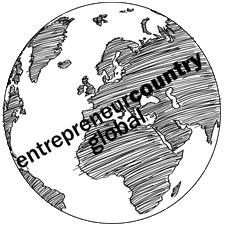Creating in Crowds
In the romantic version, entrepreneurship and individualism are synonymous. He or she is a lone visionary, a Don Quixote tilting against the windmills of business as usual, with no resources beyond an impossible dream, a mulish stubbornness, and a maxed-out credit card.
 It’s not true now. It never was. Entrepreneurs have always flocked together. More than a century before Silicon Valley became the international symbol of industrial start-ups, towns along the Naguatuck River in Connecticut comprised “Brass Valley,” a cluster of innovative manufacturing businesses. And while California’s engineers are inventing the Information Age, a muster of designers has been revolutionizing both fashion and housewares in Northern Italy.
It’s not true now. It never was. Entrepreneurs have always flocked together. More than a century before Silicon Valley became the international symbol of industrial start-ups, towns along the Naguatuck River in Connecticut comprised “Brass Valley,” a cluster of innovative manufacturing businesses. And while California’s engineers are inventing the Information Age, a muster of designers has been revolutionizing both fashion and housewares in Northern Italy.
There are many reasons why entrepreneurs (and industries, too) tend to cluster, beyond the presence of a natural resource or a port or a river. One of the most important centripetal forces is the opportunity to share ideas, insights, and energy—in bars, on bike paths, in boardrooms. (While Silicon Valley’s story is well known, a fascinating description of the “Lombardy design discourse” can be found in “Innovating Through Design” by Roberto Verganti in the December 2006 issue of Harvard Business Review.) Second, the presence of many small companies feeds on itself, creating an energy that attracts human capital and still more entrepreneurs; and when start-ups are not isolated, people can move from a company that can’t use their skill to one that can, or from a struggling outfit to a hot one. A third benefit: when many start-ups come together, they create enough mass to attract business services that otherwise wouldn’t appear, whether it’s warehouses or ad agencies or office parks.
Perhaps most important, schools of little fish attract big fish. In the ecosystem of Silicon Valley, big companies like Hewlett-Packard, later Cisco, and now Google, have always played important roles. The very presence of large, established companies acts as evidence to wary investors and bankers that there’s serious money to be made in an industry. Through acquisition or partnership, they provide financial, distribution, and other resources that would take small companies decades to build on their own. While small companies incubate technologies the big guys might one day want, large companies incubate managerial talent the little guys will one day need.
When an entrepreneurial ecosystem is healthy, it’s good for all the parties involved, and for the world as a whole. That’s why the expansion of entrepreneurcountry is important. We take globalisation so much for granted these days that we often forget how incomplete it is. The map of entrepreneurcountry in particular contains far too much white space, too many uncharted territories where a cartographer might write “Here Be Monsters.” In too many countries, laws are inimical to starting up a business, and business culture looks askance at this kind of risk-taking; a growing number of entrepreneurs can press for change in those laws and attitudes. Too many established companies aren’t challenged by ambitious new competitors, or aren’t able to rejuvenate themselves by acquiring or working with nimble newcomers; there is no better cure for industrial arteriosclerosis than the presence of competition. And in many countries, entrepreneurs are alone—or too alone—and unable to learn from each other even as they compete with each other: Their futures and fortunes are more precarious than they need be.
As entrepreneurcountry expands, it can begin to address those problems. More importantly, it will create a forum—many actually, where entrepreneurs can address those problems themselves, and begin to bring the benefits of entrepreneurial fervor to a wider world. The wealth of entrepreneurcountry—like any nation, political or economic, “real” or “virtual”—is what its citizens make it.
- Tags: blog, entrepreneurcountry, entrepreneurial ecosystem, entrepreneurs, featured, global, globalisation, media, Silicon Valley


Comments (1)
Benjamin Ndubuisi